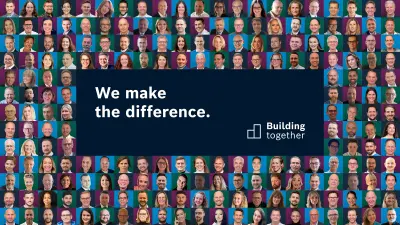“We’re always ready to ensure our customers’ safety and security”

Every second counts when there’s an emergency. The instant an alarm goes off at a customer whose security systems are connected to the Bosch emergency call and service control center, shift manager Matthias Hildebrandt goes into action. Together with his team, he ensures fast, appropriate responses to critical situations. Customers can therefore count on maximum reliability and safety at any time of the day or night.
When Matthias Hildebrandt goes to work at the emergency call and service control center in Magdeburg in eastern Germany, he never knows what to expect. No two days are alike. Around the clock, his staff stay busy dealing with alarms and alerts that arrive from connected fire alarm, intrusion alarm, and hazard alarm systems. Two other departments are responsible for video monitoring systems and emergency calls from elevators. All of the alarms and reports are verified and processed, and if warranted appropriate steps are initiated. “Our goal is always to competently help customers as quickly as possible. We want them to enjoy maximum safety and security 24/7.”
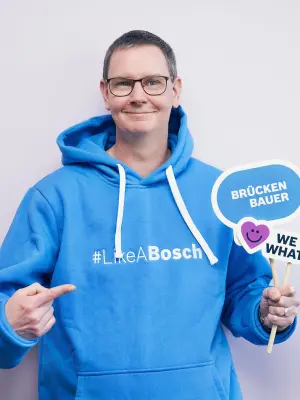
For me, quality means: making building solutions needs-oriented and future-proof.
The emergency call and service control center: the hub where everything comes together
When a call or alarm signal arrives in the emergency call and service control center, Matthias Hildebrandt and his team immediately execute an action plan that has been coordinated with the customer. It indicates precisely what needs to be done in each case. Alarms requiring an immediate response by the fire department or police are directly relayed to them. But the center deals with the vast majority of cases itself. An action plan is followed to ensure a rapid, structured response. The individual steps involved have been discussed in detail and clearly defined together with the customer beforehand to ensure appropriate responses to different situations. Alarms arrive automatically, but voice calls can also be received. Every single alarm and report is checked, and those involving hazards are prioritized. “Special requirements defined by an independent German institution called VdS need to be met for these cases,” explains Matthias Hildebrandt, “so they are dealt with first. Reports of technical problems can be handled a little later.” The action plan defines who should be informed at the customer so the required steps for resolving the situation can be initiated. Afterward all of the steps are thoroughly documented so all of the steps taken can be seamlessly traced and analyzed.
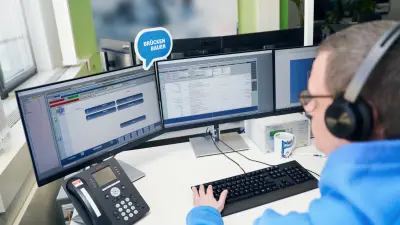
Always calm and collected: clear communication and an action plan
“When a report or alarm arrives, we initially don’t know yet whether it’s just a minor problem or something more critical. So we take each and every one seriously and respond to it while following the defined action plan,” explains the shift manager. If both video surveillance and intrusion detection alarm systems go off at a customer at the same time, Matthias Hildebrandt and his video colleagues quickly agree on who will handle what. In each case, the action plan is applied to determine the cause and rule out a false alarm. “The connection to a control center reassures the customer that there will be a rapid response. And we can be reached around the clock. It’s always about averting potential risks and quickly initiating all required steps so the customer will receive help right away.”
This adds major value for customers in the categories of retail, banks, industrial, healthcare, hotels, and critical infrastructure, among others. “I keep thinking about the enormous responsibility that we have every time an alarm goes off. This motivates me, because we’re able to prevent damage by responding so quickly. I’m glad to help our customers. Giving them all-round support really energizes me,” says the experienced shift manager.

Hundreds of reports and alarms processed and documented every day
The shift manager has skills learned in a previous job that are extremely important for someone in his position: a calm way of communicating, a knack for clearly and understandably explaining matters, and the composure that’s a must in order to stay calm and keep everything in view, also in stressful situations. Matthias Hildebrandt sees himself as a bridge builder between customers and the experts who do the hands-on work to resolve alarm situations: “I stay in touch with the customer and discuss all of the involved steps with them. When required, I pass them to a technical department like where our video experts work or the remote service, where they are helped right away. They get all the information they need and don’t have to call back again, and also don’t get put on hold.”
Matthias Hildebrandt has been working in the emergency call and service control center since 2019. After joining it he quickly advanced from team member to the position of shift manager. “I enjoy taking on lots of responsibility. And Bosch has enabled me to make even better use of this trait in a managerial role.” While supporting customers, Matthias Hildebrandt sits in front of multiple screens that he uses to assign alarms and reports to his team’s members. On average, each of them handles between 300 and 400 cases over the course of each shift. There can also be exceptional situations like natural catastrophes, which can damage technical systems. “For example, if a storm surge strikes the coast our customers can literally be up to their necks in problems. If water penetrates inside buildings and the security systems get wet, the equipment communicates all of that to us. And we let our customers know.”
-
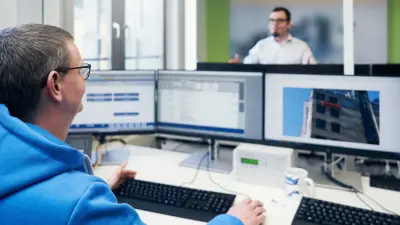
The shift manager sits in front of several screens on which he assigns the reports and alarms to the team. Each employee is responsible for 300 to 400 cases per shift -

“I enjoy taking on lots of responsibility. And Bosch has enabled me to make even better use of this trait in a managerial role,” says Matthias Hildebrandt
Reports and alarms aren’t all that arrives in the emergency call and service center. Calls also come from the technical service team of Bosch Energy and Building Solutions, for example if a colleague wants to deactivate a fire detector in a customer’s building in order to inspect it. Or if a customer has questions about their system or else wants to adjust the action plan because their building’s operating hours have temporarily changed. “We document each and every detail. This way, if someone else happens to answer the next time the customer calls, they’ll have complete information at their fingertips.”
Personal contact is indispensable for the emergency call and service control center’s work. “It lets us quickly clarify situations. Empathy is also always important, like when the person we’re talking to is worried because an alarm has gone off. A chatbot would lack the required personal touch and also couldn’t figure out complex situations anywhere near as fast. We have the experience and the ability to respond flexibly and deal with different requirements,” explains Matthias Hildebrandt. “And we can tell that our customers really appreciate getting another human being on the line.”
Pulling out all the stops – also for animals
Matthias Hildebrandt also occupies himself with the theme of safety in his personal life. Passionate about Western-style riding, he regularly visits equestrian facilities all over Germany. “I often wonder how well they are protected from fire, for example. And not just by safeguards for people and buildings, but also for the horses in the stalls,” he explains. Here too, the horse enthusiast gives his all. Together with a friend who operates a riding stable where 35 horses are accommodated and the local volunteer fire brigade, he organized a drill – with animals. The idea was to teach firefighters how to deal with stressed horses. “Each one reacts differently when its stall fills with smoke and a human wearing a breathing mask suddenly appears in front of them. All the horse sees is the mask and the smoke, so it panics and just wants to get out of there. Even experienced firefighters run up against their limits in that situation. At least, they do until we show them how to approach the horses in a way that wins their trust. So in the end, everything worked out,” recalls Matthias Hildebrandt with visible pride.

What Bosch customers can count on
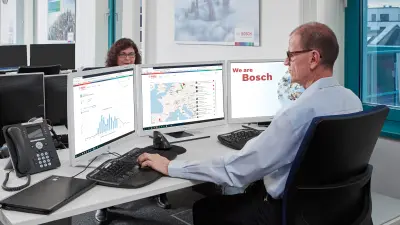
With competence in handling emergency calls based on more than a century of experience, Bosch operates one of Germany’s largest networks of safety and service control centers as a private provider. Four emergency call and service control centers receive and process incoming alarms, and malfunction signals from connected fire alarm, intrusion alarm, and hazard alarm systems, as well as signals from video surveillance systems and emergency calls from elevators. All of them are verified and processed by operators who initiate appropriate measures for dealing with emergencies.

